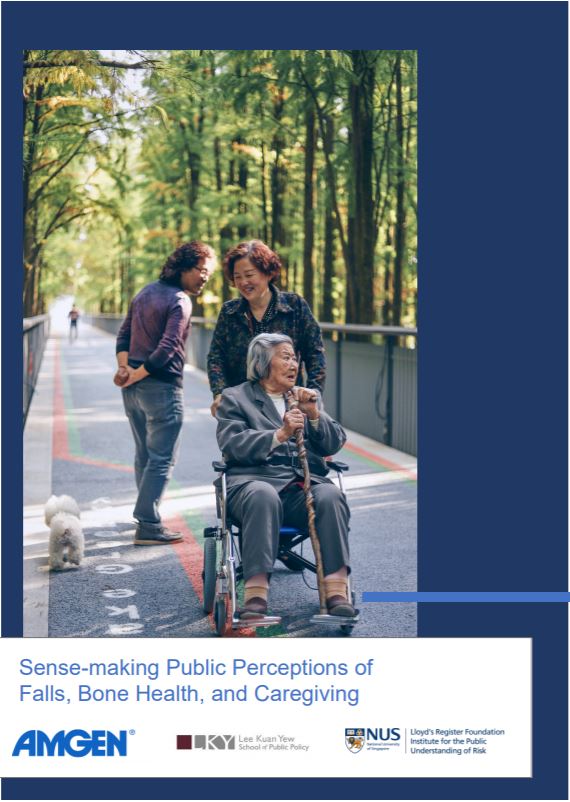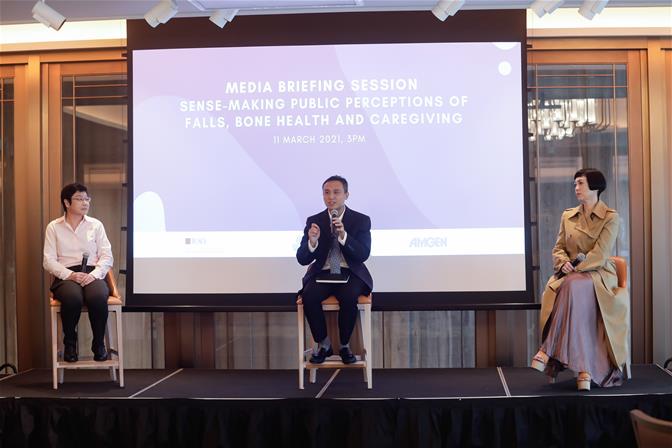
|
(Click on image or file to view publication) |
As part of Amgen's Our Unbreakable Bond campaign, the Lee Kuan Yew School of Public Policy and Amgen Biotechnology Singapore have jointly produced a research paper titled Sense-making Public Perceptions of Falls, Bone Health and Caregiving. The paper explores local sentiments towards falls, bone health and caregivers, and calls for individual, organisational and national changes to be made.
Assistant Professor Reuben Ng from the Lee Kuan Yew School of Public Policy, principal investigator of the study, Dr. Chionh Siok Bee, President of the Osteoporosis Society of Singapore (OSS) and Kit Chan, local singer and Our Unbreakable Bond Ambassador, shared their experiences and knowledge regarding the topic at the media launch of the study on 11 March 2021.

From left to right: Dr. Chionh Siok Bee, President of the Osteoporosis Society of Singapore (OSS), Assistant Professor Reuben Ng from the Lee Kuan Yew School of Public Policy, and Kit Chan, local singer and Our Unbreakable Bond Ambassador
Reframing bone health narratives
Dr Reuben Ng addressed the way bone health is narrativised and framed in Singapore society. According to the study, even though media attention on the topic of bone health has increased in Singapore, its narratives tend to be "negative and over-medicalised", and are often centred around bone-related diseases and treatment, and not on prevention.
In turn, an over-medicalised narrative creates resistance, increases ageism, delays action and results in poor patient activation, says Dr Ng. "It paralyses action," he elaborated. "No action is taken until it's too late."
Since narratives "influence how people act and behave", it is crucial to reframe bone health narratives and messages. A targeted approach is needed to spur people into taking preventative action.
This observation was echoed by Kit as well. "People have a sense of inevitability when it comes to fall and bone health, that it's natural and comes with old age," she shared, "But the truth is, it doesn't have to be."
To change public perceptions of falls and bone health, said Dr Ng, the media needs to play a role in pushing and reframing these conversations.
Incongruency between awareness and participation
Previous studies recorded an increase in hip fracture cases in Singapore, from around 1500 in 2017 to almost 3000 in 2020, and a projected increase in disability over 40 years. It is thus critical to get more Singaporeans involved in falls education programmes which are targeted towards older adults and train them in falls prevention.
However, even though 61% of older adults are aware of falls education programmes, only 9% have actually participated in these programmes. Furthermore, Dr Ng noted that among older adults who participated, only 11% were unaware of the purpose of such programmes.
"It's important that older adults are mindful of the activities that they participate," said Dr Ng. "And therein lies the importance of a caregiver."
The caregiver as an important stakeholder
The caregiver is an important stakeholder in our care ecosystem, yet they tend to fall through the cracks when it comes to conversations in the media. "Despite the important role that family caregivers play in society, they enjoy little media coverage and appreciation," Dr Ng stressed.
Using artificial intelligence and computational linguistics, the study collected information on mentions of caregivers and caregiving in local media. It turns out that cars were talked about 66 more times than caregivers, and in 2019, even bubble tea had been mentioned two times more than caregivers in the media.
The study also found that when it came to the topic of caregiving, 90% were on what Dr Ng called "hard topics". Examples include information on subsidies, resources and available caregiver schemes. On the other hand, the only "soft" topic discussed is about caregiver mental health and wellbeing.
These statistics plainly show how there needs to be more conversation about caregivers, in particular more discussion on the mental and physical wellbeing of caregivers.
Managing the burdens of being a caregiver
Few expect to be a caregiver, yet anyone could become one almost overnight, when a loved one suffers a serious fall. As a result, Dr Ng highlighted the need to stay prepared.
Drawing on her own experiences with her mother, an osteoporosis patient, Kit recommended reframing one's mindset as a caregiver. "You can either see the situation as a burden or a blessing," she said. "To me, being able to make my mother feel loved and supported is a blessing."
Organisations, too, play a part in facilitating caregiving. According to Dr Ng, established adults — referring to adult children of between 30 to 49 years — are often caught in a career-and-care crunch. They end up having to choose between caring for their ailing parents or their full-time jobs.
However, the COVID-19 pandemic has shown us that it is indeed possible to balance remote work with family responsibilities. Dr Ng thus urges organisations to adopt more flexible policies to better support caregivers.
"It is incumbent on HR policies to better support employees, so they don't have to leave their full-time jobs to be caregivers."
A holistic approach to bone health
There needs to be a change in the way we discuss caregiving. The care ecosystem has broadened, and adult children are no longer the only caregivers, said Dr Ng. Grandchildren and foreign domestic workers are increasingly involved in caregiving.
As such, caregiver messaging needs to be differentiated to account for the wider variety of caregivers. This, he believes, will accelerate caregiver education about falls prevention.
Dr Ng recommends using a targeted approach across multiple channels: TikTok videos for teenage grandchildren, and multi-lingual info campaigns in Bahasa and Tagalog. "A one-size-fits-all approach is ineffective, we need targeted messaging through different channels to reach different audiences," says Dr Ng.
The importance of education
Among the various difficulties she faced during her experience as a caregiver, Kit shared how difficult it was for her and her sisters to find information on how to take care of their injured mother. "We had to learn by copying what the nurses and physiotherapists did," she recalled.
This is a problem that Dr Chionh highlighted as well, and she believes that information and resources on osteoporosis and bone health are lacking. "Access to information is piecemeal," she said. "We need to put all the information in one place for easier access."
Furthermore, it is important to educate the public on osteoporosis prevention. The OSS has set up the bone health ambassador programme to conduct intensive courses and training for individuals and organisations. The sessions aim to educate individuals on not just the medical aspects of osteoporosis, but also on how to lead a bone-healthy lifestyle.
Finally, Dr Chionh believes that education on osteoporosis prevention isn't just for older adults. Rather, it needs to start young, and she advocates implementing bone health ambassador programmes in local schools.
"If they have a bone-healthy lifestyle from a young age, and build up a good bone and muscle mass, the chances of disability from a fall will be greatly reduced even after menopause."
Download Sense-making Public Perceptions of Falls, Bone Health, and Caregiving
Media coverage:
Important that caregivers are educated on fall prevention, study shows, The New Paper, 15 March 2021
Singapore study signifies caregiving awareness to osteoporotic seniors, BioSpectrum, 11 March 2021
Fall Prevention Study, CNA938 Health Matters, 16 March 2021
(Photo credit: cocoparisienne)